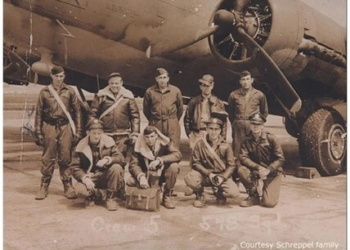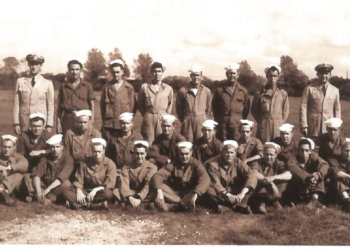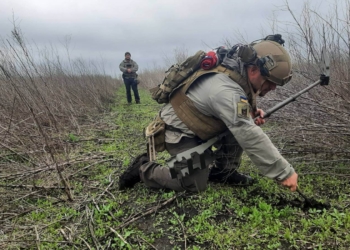Ryan Hendrickson is a retired Green Beret who’s been through a lot. Despite overwhelming challenges, he refuses to wear the title of victim and instead calls himself a survivor. He wants you to do the same.
Tip of the Spear wasn’t supposed to be a book. It started as a journal for Hendrickson, a way to work through his thoughts and post-traumatic stress. But after a few months, he saw something in those writings – as did friends.
“The therapeutic effect I got from writing actually turned into a book. I had to see the silver lining in something as bad as stepping on an IED [improvised explosive device]. A lot of people that were reading it said the book talks to everyone — not just military — as far as not being a victim in your life,” Hendrickson explained.
In September of 2010, Hendrickson was deployed to Afghanistan as an 18 Charlie, a Special Forces Engineer with Alpha Company, 2nd Battalion, 7th special forces. He had just completed the elite schooling to earn the coveted Green Beret and was feeling on top of the world. The first chapter of Tip of the Spear takes the reader vividly through what it’s like to arrive in Afghanistan – and the mission that changed his life.
When Hendrickson and his team entered the deserted Afghan village before dawn, he said he knew something big was coming. When his interpreter went too far ahead of uncleared ground, he had no choice but to quickly and quietly get him back.
“I grabbed him by the back of the shirt and moved him around. You never like to have any unknown area or blind spot, so I put the muzzle of my M-4 in the doorway of the compound and stepped back… right onto the IED,” he shared.
Hendrickson said he didn’t realize he hit it at first, remembering that he just felt like he couldn’t breathe because of the heavy dust and ammonia in the air.
“As the dust started to clear, I saw that my boot was six inches away from my leg…When I reached behind my knee to pull my leg up, my boot sort of flopped over with my toes pointed at me. I saw these two pearly white objects sticking out of my pant leg. Then it kicked in that it was bone,” he said.
READ: Brothers in Arms travels over 16,000 miles to help families of fallen from AAV accident
It was then that Hendrickson realized it was really bad. His team couldn’t rush in to support him either, since they knew that if there was one IED, there were probably five. His interpreter started a tourniquet, effectively saving his life. After a while, his team was able to safely make it to him and they got him out.
“We could hear the Taliban on chatter celebrating that I got hit and that they were going to move into position to ambush us. They splinted the leg the best they could to put the lower and upper part together,” he said.
Hendrickson was in theater for over a week as they tried to stabilize him and keep him alive. When he made it to San Antonio, it would take 28 surgeries to reattach his leg. Then the real work began.
“I had a sergeant major who came in to see me; he told me if I could get medically cleared he’d send me back to combat. That was the big driving factor behind me taking control of my life and hitting rehab as hard as I could. That and knowing the Taliban were cheering when I got hurt. I wasn’t going to let them beat me or win,” he explained.
Although he was medically retired, Hendrickson refused to accept it. After spending a grueling year in rehabilitation, he passed all the required tests and was reinstated into active duty through a special waiver. In March of 2012 – only a year and a half after almost losing his leg to an IED – his boots were back in the sands of Afghanistan.
It wasn’t easy though, he shared. The guys he was working with were concerned he’d be a liability. Hendrickson was sent to the biggest known IED province of Afghanistan, a real test given his own experience. He had to prove himself to his teammates and did it by methodically finding IED after IED, keeping them all safe.
Hendrickson would continue to serve and deploy for years after that. In 2016, he earned a Silver Star for heroic efforts during a difficult seven-hour firefight in Afghanistan.
“It wasn’t what I did, it was what we did…It’s the same thing all of us say, we were just doing our job,” he shared.
He headed home from Afghanistan in 2017 and found himself struggling with a lot, mentally.
After trying unsuccessfully to talk with a counselor, he sought help through the chaplain. He advised him to write, using that avenue to tell his story and work through his thoughts. Those thoughts and writing were unknowingly turning into a story of his life, both the good and the bad. It was here that he found healing and the deep resiliency he needed to never feel like a victim again.
Tip of the Spear will bring the reader on a powerful journey through a difficult childhood leading to military service spanning three branches, ultimately leading Hendrickson to become an elite Green Beret. The story culminates with the unfathomable challenge of coming back from an injury that almost took his life and was certainly considered the end of his military career. Hendrickson refused to quit and fought his way past the odds stacked against him.
It’s Hendrick’s hope that readers will use his journey to be inspired to do the same in their own lives. Anything is possible he says, but first you have to become a survivor, not a victim.
To purchase your copy of Tip of the Spear, click here.









































